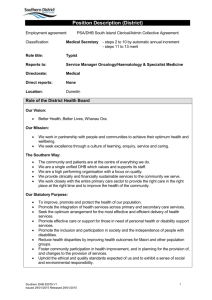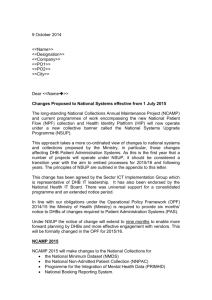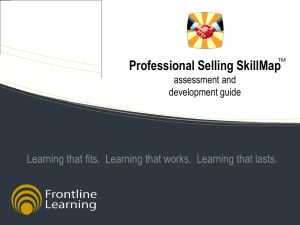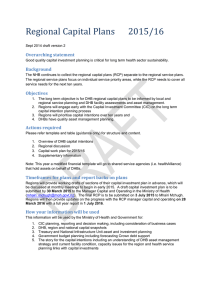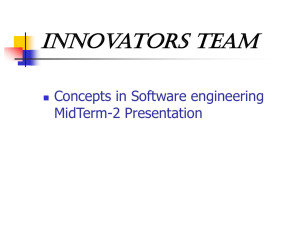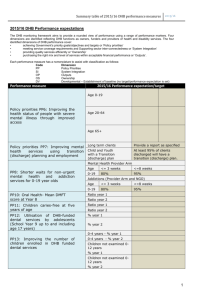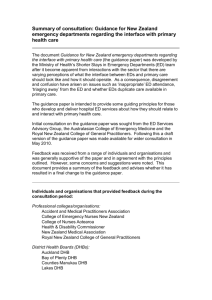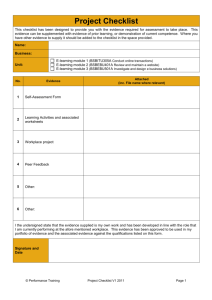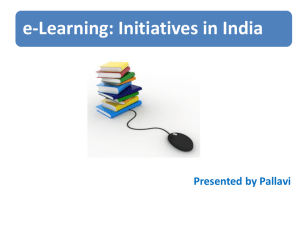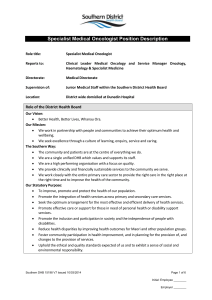Regional e-learning request form
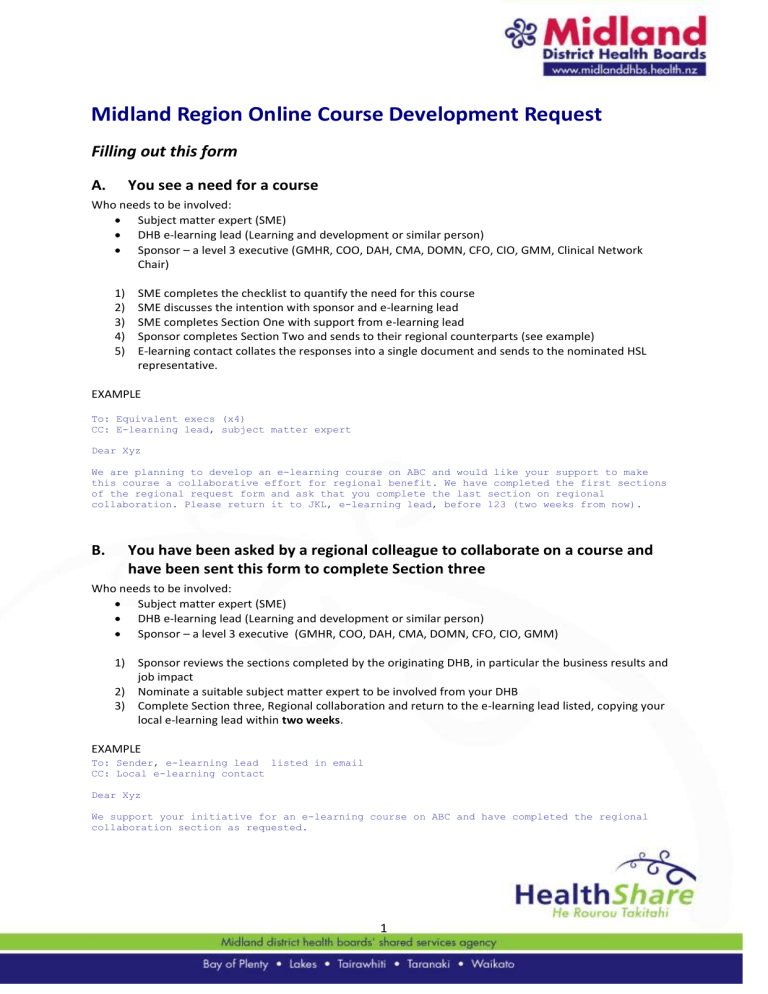
Midland Region Online Course Development Request
Filling out this form
A. You see a need for a course
Who needs to be involved:
Subject matter expert (SME)
DHB e-learning lead (Learning and development or similar person)
Sponsor – a level 3 executive (GMHR, COO, DAH, CMA, DOMN, CFO, CIO, GMM, Clinical Network
Chair)
1) SME completes the checklist to quantify the need for this course
2) SME discusses the intention with sponsor and e-learning lead
3) SME completes Section One with support from e-learning lead
4) Sponsor completes Section Two and sends to their regional counterparts (see example)
5) E-learning contact collates the responses into a single document and sends to the nominated HSL representative.
EXAMPLE
To: Equivalent execs (x4)
CC: E-learning lead, subject matter expert
Dear Xyz
We are planning to develop an e-learning course on ABC and would like your support to make this course a collaborative effort for regional benefit. We have completed the first sections of the regional request form and ask that you complete the last section on regional collaboration. Please return it to JKL, e-learning lead, before 123 (two weeks from now).
B. You have been asked by a regional colleague to collaborate on a course and have been sent this form to complete Section three
Who needs to be involved:
Subject matter expert (SME)
DHB e-learning lead (Learning and development or similar person)
Sponsor – a level 3 executive (GMHR, COO, DAH, CMA, DOMN, CFO, CIO, GMM)
1) Sponsor reviews the sections completed by the originating DHB, in particular the business results and job impact
2) Nominate a suitable subject matter expert to be involved from your DHB
3) Complete Section three, Regional collaboration and return to the e-learning lead listed, copying your local e-learning lead within two weeks.
EXAMPLE
To: Sender, e-learning lead listed in email
CC: Local e-learning contact
Dear Xyz
We support your initiative for an e-learning course on ABC and have completed the regional collaboration section as requested.
1
Checklist
Use this Quick Checklist to identify the weighting of your on-line development request.
Rationale Score
1. Will this course contribute to compliance with national standard / legislation?
e.g. The Health and Disability Services (Safety) Act 2001 requires Designated Audit Agencies to audit healthcare facilities in order to measure compliance against NZS 8142:2000 Infection Control
2. Will this course contribute to achievement of a national health target?
Shorter stays in ED, Improved access to elective surgery, shorter stays for cancer treatment, increased immunisation, better help for smokers to quit, more heart and diabetes checks. http://www.health.govt.nz/newzealand-health-system/health-targets
3. Will this course contribute to the achievement of a core output identified in the current Midland DHB’s Regional Service Plan (RSP)?
http://www.waikatodhb.govt.nz/page/pageid/2145849563/Midland_DHBs/HealthShare.html
4. Is this course a Regulatory Authority requirement? E.g. Nursing Council of New Zealand requirement for Professional Development on Nursing Code of Conduct by 2015 for all registered Nurses and enrolled Nurses.
5. Staff required to complete this course:
All Staff = 5
Clinical staff in more than one professional area = 3
Clinical staff in only one professional area = 2
Non-clinical staff = 2
6. Localisation:
Course content will be the identical for all Midland DHBs = 5
Course content will have a common core with some localisation for each DHB = 3
Course content will have a common core with major localisation for each DHB = 0
7. Course development:
Course can be developed by requestor = 5
Course can be partly developed by requestor = 3
Course needs to be fully developed by HSL = 0
Select
Select
Select
Select
Select
Select
Select
TOTAL /35
Range for total :
0-10: Not a priority 11-25: Good 26-35: Excellent
2
Section one: Course details (Subject matter expert to complete)
Subject Matter expert
Your name:
Your email:
DHB Lead Name
Other SMEs or facilitators
Target Audience
Delivery
Course Type*
Your position:
Your phone:
DHB Lead email
Course Detail
All Staff
Occupational group (specify)
Fully on-line
Blended Learning
(classroom & e-learning)
Select the course type
Workshop prerequisite
Other (specify)
Education level* Select the appropriate level
Planned release date?
Course Learning
Objectives
Key knowledge to be developed by;
Key skill to be developed by;
Application of key skills by;
Learning outcomes
Exam pass rate, skill performance, progress alog specified learning path.
Learner satisfaction
Satisfaction scores, completion rate comments.
State how you will know the learners have learned e.g. 100% pass mark in course with 2 / 3 attempts
State the level of satisfaction you require e.g. 80% of staff in the course felt the course was worthwhile
Promotion strategy
Flyers posted on ward notice boards for 2 months. Intranet headline run three times.
Inservice sessions
Describe how you will promote this course to your staff
3
Section two: Business alignment and impact (Sponsor* to complete)
Sponsor
Your name: Your position:
Your email:
Commitment
What financial and or human resources will you commit to:
Your phone: a) course development b) ongoing delivery and maintenance?
Strategic Alignment
Describe:
Legislative requirement
Midland Regional Service Plan
DHB Organisational Goal
(State relevance to regional / DHBs organisational goals/strategic priorities )
Yes No
If yes, Specify act
A professional requirement for an occupational group
Yes No
If yes, Specify how
Evaluation Level Measures
Business results
Business performance indicators, quality improvement.
Job impact (learning transfer)
Sponsor’s signature
State what you expect to see e.g. Reduced sentinel events by x %
Expected $ cost savings
State what changed behaviours you expect to see.
Method
Demonstrate how this information will be gathered.
Who, what and when
Demonstrate how this information will be gathered.
Who, what and when
4
Section three: Collaboration (Other DHBs to complete)
DHB
Sponsor’s name:*
Subject Matter Expert(s):
DHB Lead Name
Acceptance of proposal
Please indicate whether you support the application as it stands or with modification
as proposed
Sponsor’s position:
DHB Lead email
with changes
If with changes, please describe
Do not support
Commitment
What financial and or human resources will you commit to: a) course development b) ongoing delivery and maintenance?
Business results
Business performance indicators, quality improvement.
Demonstrate how this information will be gathered at your DHB. Who, what and when.
Job impact (learning transfer)
Demonstrate how this information will be gathered at your DHB. Who, what and when.
Promotion strategy
Flyers posted on ward notice boards for 2 months. Intranet headline run three times. Inservice sessions
Describe how you will promote this course to your staff
Sponsor’s signature
5
Additional notes
Course types
1) Informational / Instructional: Self paced learning of up to 30 minutes. Staff member reads or watches presentation of information followed by formative assessment.
2) Compliance / Competence: Self paced learning of up to 90 minutes. Staff member reads or watches presentation of information followed by summative assessment to demonstrate understanding.
3) Short course Educational: Self paced learning of up to 120 minutes. Staff member reads or watches presentation of information, may participate in collaborative learning activities followed by summative assessment to demonstrate understanding and application.
4) Course / Educational: Semi-directed / facilitated learning - may be blended (e.g. part online, part workshop).
Staff member builds knowledge and understanding through a range of methods including participation in collaborative learning activities followed by summative assessment to demonstrate understanding and application.
5) Regulated Programme: Made up of multiple sessions spread over an extended period of time. Staff member builds knowledge and understanding through a range of methods including participation in collaborative learning activities followed by summative assessment to demonstrate understanding and application.
Education levels
1.
Basic life skills (not used by Midland MVLE)
2.
Basic subject knowledge, skills and application
3.
Operational subject knowledge, skills and application
4.
Broad theoretical and technical subject knowledge, skills and application
5.
Specific theoretical and technical subject knowledge, skills and application
6.
Specialised subject knowledge, skills and application
7.
Professional subject knowledge, skills and application
8.
Distinguished in profession
6
